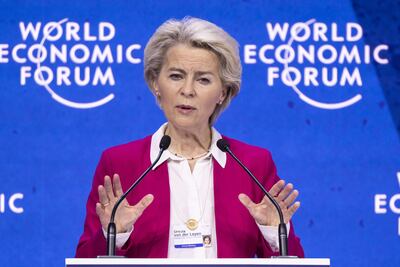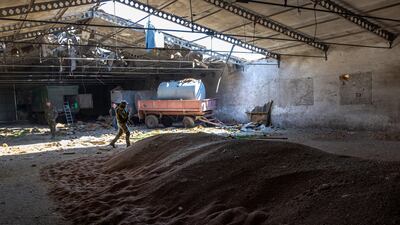Live updates: follow the latest news on Russia-Ukraine
The EU on Tuesday accused Russia of deliberately engineering the emerging global food crisis by bombing Ukrainian warehouses, confiscating crops and “using hunger and grain to wield power”.
European Commission president Ursula von der Leyen said runaway bread prices in Lebanon and stalled food shipments to Somalia were the result of Russia’s “shameful acts” during its three-month invasion of Ukraine.
The war between two of the world’s top agricultural producers has sent alarm bells ringing among global aid workers, adding potential food shortages to the energy and humanitarian crises unleashed by the conflict.
In addition to blocking food shipments from Ukraine, Russia is hoarding its own supplies “as a form of blackmail” to win political support, Ms von der Leyen said in Davos at a World Economic Forum overshadowed by the war in Europe.
Recalling the Soviet-era famine that devastated Ukraine in the 1930s, she told delegates that Russia’s alleged seizures of grain stocks and machinery had “brought back memories from a dark past”.
“Global wheat prices are skyrocketing, and it’s the fragile countries and vulnerable populations that suffer the most,” she said, after accusing Russia of deliberately bombing warehouses and blockading ships carrying grain and sunflower seeds.
“On top of this, Russia is now hoarding its own food exports as a food of blackmail, holding back supplies to increase global prices or trading wheat in exchange for political support. This is using hunger and grain to wield power.”

Poland’s President Andrzej Duda said food shortages in North Africa as a result of the war would spur more migration across the Mediterranean to Europe, a route which EU leaders have been trying to narrow for years.
The bloc is looking to mitigate the grain crisis by importing Ukrainian food over land, avoiding the mine-laden shipping lanes of the Black Sea, and increasing its own agricultural output.
Ms von der Leyen said she was working with Egypt’s President Abdel Fattah El Sisi to hold an event on food security, with Europe regarding greater African food production as a longer-term guarantee of food security.
But political and business leaders at Davos were urged not to compromise their countries’ security for economic gain, after the war in Ukraine exposed much of Europe’s reliance on oil and gas imported from Russia.
On Tuesday, the US and EU said Russia’s moves to cut off fossil fuel exports, most recently to Finland, had “demonstrated that it is an unreliable supplier of energy”.
Nato Secretary General Jens Stoltenberg said at Davos that gas exports had given Russia a tool to intimidate its neighbours and that western nations should assess their trade with China for similar security risks.
He cited over-reliance on energy imports, exports of sensitive technology such as artificial intelligence and control over infrastructure such as 5G mobile networks as areas where democracies could be found vulnerable.
“We must recognise that our economic choices have consequences for our security,” he said. “Freedom is more important than free trade. The protection of our values is more important than profit.”
Mr Stoltenberg said Russia’s invasion had backfired because Nato is now poised to welcome two new members in Sweden and Finland, an enlargement of the alliance that the Kremlin had sought to avoid.
He said he was confident that Turkey’s threat to stop their accession could be overcome, with diplomats set to discuss President Recep Tayyip Erdogan’s stated concerns about terrorist fighters in the two Nordic countries.
Sweden and Finland will send delegations to Ankara this week hoping to clear up differences with Turkey, Finnish Foreign Minister Pekka Haavisto said on Tuesday.
“I’m confident that we will be able now, as we have done so many, many times before in Nato, to find a way to solve these issues and to agree, and then to welcome Finland and Sweden and fully-fledged members of our alliance,” Mr Stoltenberg said.











































